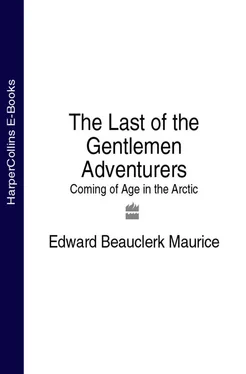I soon accustomed myself to the odours and settled down to examine the native home. The most surprising thing about the ‘house’ was that it should be the abode of so many people. There were four adults seated on the platform and four children playing on the earth floor near the entrance. Right round the edges of the interior were spread the bags and boxes containing the worldly possessions of the family – clothes, sewing outfits, tool boxes and other oddments. The sleeping space was covered as usual with skins, while along the front edge a row of stones had been laid to form a separating line from the kitchen and work space. That this was the home of a good hunter was clear from the two large, brightly burning oil lamps, for only the more successful men could afford to burn oil on this scale. The family were also well clad, while the bedding skins looked new and clean.
Crouched on one side of the platform was a very ancient woman. Her face had been tattooed with some indistinguishable design and she looked to be about a hundred, though she was probably not more than sixty, which is an advanced age for the Innuit. The old lady was in charge of one of the lamps. Her method of looking after it fascinated me. She had a pot full of fresh seal fat from which she would cut little pieces to pop into her mouth, where she apparently ‘milled’ the blubber, spitting it out as oil into the dish of the lamp, presumably without mixing it with any of her saliva, for the lamp did not splutter.
This reminded me of one of the first warnings given to me regarding Eskimo hospitality, in the form of a story about a new R.C.M. policeman a year or two previously. It seemed that this man, out on the trail with his Eskimo driver, was welcomed one night into a family home in much the same way as I had been.
Once he had settled in, he was offered a plateful of what appeared to be a rather tempting, creamy mixture which he ate with such relish that his host asked him if he would like some more. The policeman passed over his plate for replenishment, whereupon the hunter spoke to the old woman sitting in the back of the tent, who promptly reached into a container she had by her, pulled out a length of deer fat and cut it into small pieces, popping the bits into her mouth. The traveller watched in horror as the old woman spat the pre-chewed fat on to his plate, his stomach protesting so violently at this revelation of the nature of the delicacy he had so much enjoyed that he had to rush out of the tent.
Kilabuk gave the lady of the house one of our seal carcasses, and considering the limited cooking facilities available, the hunter’s wife prepared the meal in a surprisingly short time.
The men dug chunks of meat out of the pot, trimming the size with a knife, and put them straight into their mouths. The ladies used a women’s knife called an oolu , which consisted of a semi-circular blade with a handle attached that was used, apart from cutting up the food, for all sorts of work on skins. There were no plates and fingers served as forks or spoons. Kilabuk made the tea, producing biscuits from our supply, so everybody had a good blow-out, for the Eskimos seldom pass up the opportunity of having a hearty meal, especially when the kudloona ’s limitless supplies are at hand, though they are themselves generous with their food, always sharing whatever meat may be available.
Since there were to be six adults and four children crowded together for the night in a comparatively small space, it did not seem likely to be a very peaceful time, but anxiety about the possible noise did not in the end concern me as much as it might have done. Before we retired, the hunter’s wife held out her baby over a pot to relieve itself, which it did in no uncertain manner. Not until I had composed myself for sleep did I realize that the pot in which the child had done its business was the same one as had been used to cook the stew. I lay awake considering the implications of this discovery for a long time, but finally fell asleep, taking cold comfort from the thought that it is only possible to die once.
Early in the morning, the boy who was sleeping next to me flung out one of his arms and struck me in the face. I awoke and lay as still as possible for the next hour or two so as not to disturb my neighbour. The oil lamps had gone out, but had left behind a pungent tang of burned fat, strong enough to assert itself above the continuing odours of bodies and meat. A greyish light filtered through the treated skins of the tent. Most of the others were sprawled in sleep. The small child was making soft mouthing noises. Beevee was intoning what sounded like a psalm. The owner of the home lay flat on his back, snorting every now and then. The rest of the people were quiet, but the old woman at the end of the platform was sitting up, staring into the darkness, oblivious to the noise. The hours crept on. It seemed ages before the women stirred themselves, relit the lamps and began the morning chores.
I declined the offer of another helping of stew, freshly cooked in the all-purpose pot, contenting myself with a mug of tea and a couple of biscuits from my dwindling stock.
We had a cold journey home. It began to snow soon after we had left the camp and the damp flakes drifted round our faces all the way back. From time to time the engine coughed sadly and stalled, so that we sloshed about on the water, veering with the wind, while Kilabuk huddled over the thing trying to persuade it to start up again. We seemed forlorn and abandoned, and the scene reminded me painfully of a picture that had been stowed away up in the attic at home, of some doomed vessel wallowing helplessly in a stormy sea. Fortunately this was to the Eskimos all in a day’s work and eventually we arrived safely at the foot of the bank below the welcoming lights of home.
Alan brewed a steaming pot of coffee, to the odour of which we added the fragrant smell of a splendid frying-pan hash-up, and I was soon able to recount the stories of my adventures in a light-hearted manner.
IV
I HAD LOST TRACK of the days during our expedition. Somehow it had not seemed to be of any importance what day it was. I was pleased to discover on our return from the hunting trip that it was Saturday night, and though this did not have the same significance up north as in less remote spots, it was special in one way. The Canadian broadcasting authorities used the CKY Winnipeg station, after the usual broadcast programme had closed down, to relay messages from friends and relations in the outside world to the men and women of the Arctic.
This was the only channel of communication from the south at this time, so practically all northerners spent the early hours of Sunday morning with their heads glued to their radio receivers.
Our set was of uncertain temperament. With the greatest of care and gentle tuning, Alan would bring in the Winnipeg station, often quite clearly, for a period before our programme started, but as soon as the announcer began the messages, the trouble commenced and the old set would go off into shrieking oscillation. Sometimes holding an admonitory finger about an inch in front of the receiver would do the trick, but only so long as there was no movement, for the slightest variation of position would upset everything, bringing on the howling with renewed vigour.
I once got a message through from my mother, who had left for New Zealand during the autumn after my departure, to say that they were safe and well after a severe earthquake. This I heard quite clearly, though I had not known about the disaster. Had it not been for Alan’s patient determination with this infuriating piece of equipment, we should have heard nothing at all. As it was, quite often we received at least part of the programme.
On Sunday mornings, Geordie would pad across from his bedroom into the little storeroom and bring out a tin of English sausages. They came in a very special, superior-looking tin and were as different from the ordinary sausages, which flopped like congealed sawdust out of a large can, as a tender beef steak is from a hunk of old bull walrus meat. On the morning after my return, however, we had to pay for our treat. The water supply had run low, and as all the Eskimos would be going to church, Alan and I would have to hoof it back and forth to the river to fill the tank.
Читать дальше












